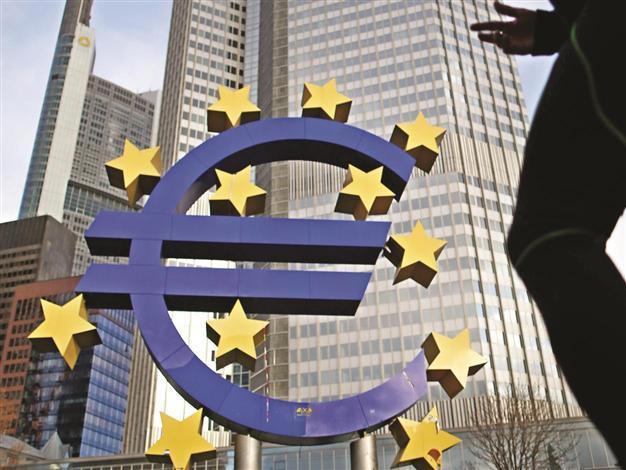ECB to ring in New Year with interest rate on hold
FRANKFURT - Agence France-Presse

A man walks next to the Euro currency sign in front of the European Central Bank (ECB) headquarters in Frankfurt.
REUTERS photo
The European Central Bank will usher in 2013 with steady interest rates at its first policy meeting this year to keep up the pressure on governments to solve the debt crisis, analysts predict.
With ECB interest rates currently at record lows and its latest anti-crisis weapon ready and primed for action, central bank chief Mario Draghi will not pass up the opportunity to insist once again that only governments can resolve the long-running crisis, economists said.
“Whilst a (rate) cut cannot be entirely ruled out, we do not expect the governing council to change interest rates at its meeting [on Jan. 10],” said Commerzbank economist Michael Schubert.
“On the one hand, ECB executive board members have tried to dampen rate cut speculation over recent weeks, and on the other, important sentiment indicators have increased once again,” he said.
New tiny hopesOn Jan. 4, the closely watched Purchasing Managers Index (PMI) for the entire euro area hit a nine-month high, offering hope the single currency area could be moving out of its deep double-dip recession.
Recent data for Germany, Europe’s biggest economy, have also come in better than expected.
And German Finance Minister Wolfgang Schaeuble even went so far as to say he believed the embattled eurozone was now past the peak of its three-year-long debt crisis.
Market tensions have indeed eased since the ECB unveiled its anti-crisis bazooka in September, the so-called OMT bond-purchase program.
The scheme is credited with marking a turning point in financial market sentiment towards the crisis-wracked euro even though it has not actually been used.
With markets now calmer, the ECB has been able to keep its gunpowder dry, keeping interest rates at their all-time low of 0.75 percent and holding fire on other emergency anti-crisis measures as well, after pumping vast amounts of liquidity into the markets at the beginning of last year.
No immediate need to act Nevertheless, at last month’s meeting, ECB chief Draghi appeared to open the door to further rate cuts, crucially revealing that there had been “wide discussion” of such a move on the decision-making governing council and that the decision to keep rates on hold was anything but unanimous.
Commerzbank’s Schubert pointed out, however, that top board members -- such as Yves Mersch, Peter Praet and Joerg Asmussen -- have all sought to play down possible rate cuts recently.
Deka Bank chief economist Ulrich Kater was similarly convinced that Draghi would not announce any monetary easing at his first press conference of the year.
“The policy of low interest rates is finally making itself felt in the periphery countries, thereby taking the pressure off the monetary policy actors to come up with new stimulus measures,” he said.
“For the time being, there is no immediate need to act,” he said.
In the United States, the U.S. Federal Reserve hinted last week that its own huge program of stimulus measures was under review and could be brought to an end sometime this year. Capital Economics economist Jonathan Loynes cautioned, however, that “having prevented catastrophe in 2012 by pledging to do whatever it takes to save the euro, the ECB will have to follow words with actions in 2013.”
While Loynes said he was expecting no policy changes, “the pressure for action may soon be irresistible.”
Postbank economist Thilo Heidrich said the likelihood of a rate cut was “wide open”, but that he was betting on a further quarter-point reduction in the key refi rate to 0.5 percent in the early months of this year and the ECB would keep it there “for some time to come.”
